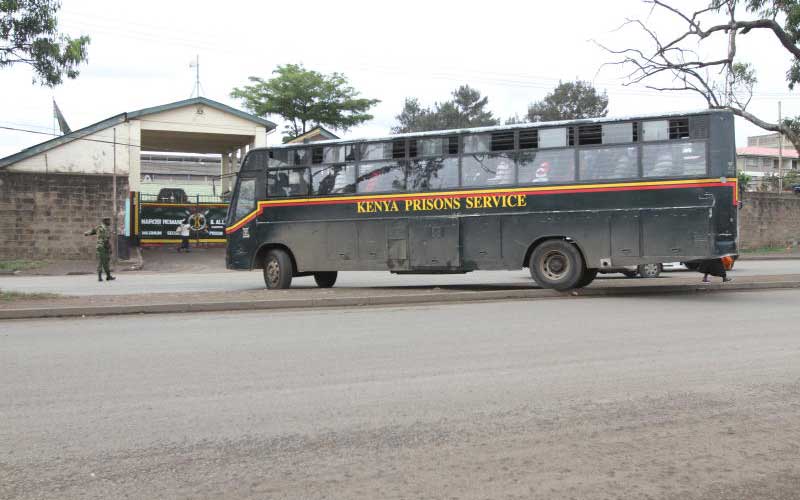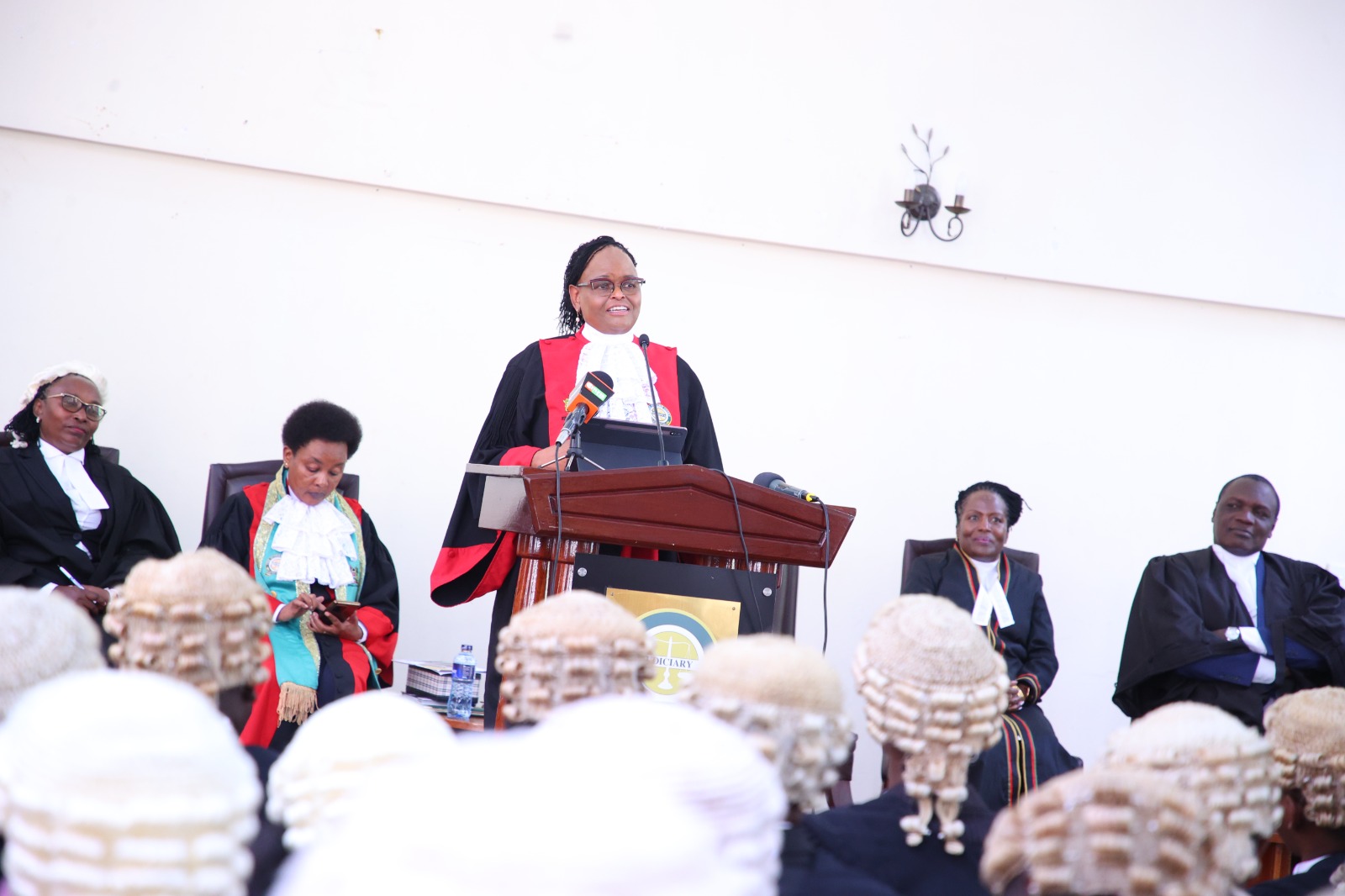376 offenders to be released from Nairobi Remand Prison in new decongestion plan

Currently, the total inmate population stands at around 62,000, far surpassing the intended capacity of 30,000.
5Chief Justice Martha Koome has unveiled a new Prisons Decongestion Initiative aimed at alleviating overcrowding in Nairobi's prison facilities.
The initiative, launched on Monday, seeks to ease the strain on the overcrowded prison system and enhance the efficiency of the judicial process.
More To Read
- Private prosecution in Kenya: What you need to know and why courts rarely allow it
- Explainer: How courts operate when the judiciary goes on recess
- Lawyer petitions CJ Koome to lift restrictions on e-filing system, cites rights violations
- Senator Sigei urges state agencies to share responsibility for protecting human rights
- Judiciary faces Sh576.6 million pending bills amid budget review
- Over 31,000 SGBV cases filed as courts improve response, Judiciary Report shows
Currently, the total inmate population stands at around 62,000, far surpassing the intended capacity of 30,000.
The initiative will see the release of approximately 376 out of 4,000 offenders from the Nairobi Remand and Allocation Maximum Security Prison in the Industrial Area.
Speaking during the launch, Chief Justice Koome emphasised that the initiative will be implemented in two phases.
The first phase focuses on reviewing the bail and bond conditions for unconvicted individuals currently held in remand within the Nairobi region, guided by the principle that "unconvicted persons should not remain in custody merely due to an inability to afford bail or bond."
The second phase will involve an ongoing review of sentences by High Court judges, aiming to achieve a sustainable prison population.
Koome noted, “I have issued a Standing Order for decongestion exercises to be carried out every quarter.”
Chief Justice Koome reaffirmed the criminal justice reform efforts, including advancing plea bargaining and diversion initiatives.
“For instance, petty offenders should not be subjected to incarceration. Instead, they should be diverted to community service or alternative sentencing options that enable them to contribute positively to society," she stated.
The Judiciary’s action plan also encompasses revising bail and bond conditions, promoting community service, and reassessing sentencing for minor offences to support a sustainable prison population.
Chief Justice Koome highlighted that "this situation is made worse by the fact that some facilities like the Industrial Area Remand and Maximum Prison are operating at 200 per cent of their capacity, effectively hosting twice the number of inmates they were designed to accommodate."
The programme will seek to reduce prisoner numbers through a review of bail and bond terms, revised sentencing for misdemeanours, and the promotion of community service.
 Chief Justice Martha Koome presides over the admission of 401 Advocates to the bar, on Monday, July 1, 2024. (Photo: CJ Martha Kooome/X)
Chief Justice Martha Koome presides over the admission of 401 Advocates to the bar, on Monday, July 1, 2024. (Photo: CJ Martha Kooome/X)Chief Justice Martha Koome presides over the admission of 401 Advocates to the bar, on Monday, July 1, 2024. (Photo: CJ Martha Kooome/X)
"Overcrowded prisons are not conducive to humane living conditions, and without such conditions, the dignity of those incarcerated is compromised. It is imperative that we restore the prison environment to one that supports the rehabilitation of offenders, as this is the only way we can hope to reintegrate them into society as responsible and reformed," CJ Koome said.
The judiciary is also implementing long-term measures to prevent the unnecessary detention of unconvicted persons. One such measure is the Bail and Bond Policy, which has been in operation for some years now. Koome stated that the judiciary is committed to ensuring its uniform application across the country. Under this policy, magistrates will be sensitised to maintain predictability and fairness in imposing bail and bond terms, ensuring that the conditions are within reach for most accused persons.
"As we launch this initiative, we do so with the clear understanding that the challenges we face require not just immediate action, but sustained and strategic efforts that will transform our correctional system into one that reflects the highest standards of justice and human dignity," added the Chief Justice.
According to prison records, facilities in the Nairobi region alone host 9,458 inmates, of which 2,496 are convicts, and a staggering 4,962 are unconvicted persons awaiting trial, including civil debtors.
During the event, Chief Registrar of the Judiciary Winfridah Mokaya noted that, although the initiative aims to release 376 out of 4,000 offenders, the Nairobi Remand will still operate at nearly twice its intended capacity of 2,000.
“The situation is similar across all prison facilities nationwide. I am therefore pleased to be part of this process, which allows us to administer justice with mercy and work towards a sustainable prison population. Today’s approach to criminal justice is focused not on pure retribution, but on reforming offenders and reintegrating them into society as productive citizens living within the law.”
Correctional Services Principal Secretary Dr. Salome Beacco noted that the increase in prisoner populations has led to many challenges, including acute congestion. She emphasised that the need for an urgent and sustainable solution to decongest these facilities cannot be overemphasised.
Chairperson of the Community Service Orders (CSO), Justice Lilian Mutende, reiterated, “Overcrowding in prison is a matter of concern that must receive attention. Petty offenders should be diverted from the criminal justice system in order to repair the harm caused.”
Commissioner General of Prisons Patrick Aranduh lauded the initiative, noting that the decongestion exercise will contribute to the humane treatment of offenders.
“I want to extend my gratitude to the Chief Justice for honouring this event. It demonstrates a genuine commitment for all to access justice. The Kenya Prison Service continues to face many challenges, key among them being the congestion of prisoners,” he said.
Top Stories Today













































